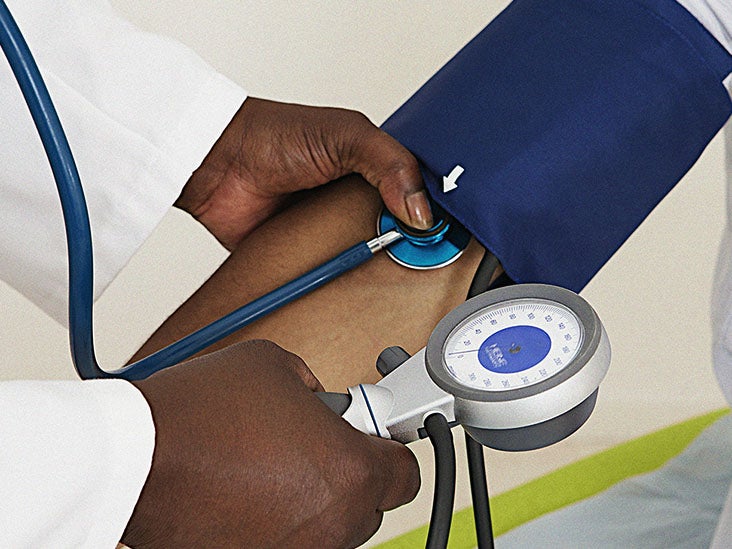Resistant hypertension: Symptoms, causes, treatment, and more - Medical News Today

A person with high blood pressure has several medication and lifestyle change options to help reduce their blood pressure reading. Doctors categorize resistant hypertension as high blood pressure that does not respond to aggressive medical treatment.
Blood pressure is the amount of pressure the blood places against the artery walls. Hypertension, or high blood pressure, occurs when the pressure on the artery walls is higher than it should be.
Over time, the extra pressure can damage a person's artery walls, which can lead to a buildup of plaque. Plaque buildup can eventually partially block or fully block the flow of blood, which can lead to heart disease or stroke.
The following article discusses resistant hypertension, its symptoms, possible causes, treatment, and more.
Resistant hypertension occurs when a person's high blood pressure does not improve when a person's blood pressure remains above their goal, and they are taking three blood pressure medications at the maximum dose,
- long-acting calcium channel blockers
- angiotensin-converting enzyme inhibitors
- angiotensin recept blockers
- a diuretic
A doctor may diagnose resistant hypertension if a person requires four or more medications to achieve their blood pressure target.
According to the
- Elevated: A systolic blood pressure of 120–129 millimeters of mercury (mm Hg) and a diastolic blood pressure of 80 mm Hg.
- Hypertension Stage 1: A systolic blood pressure of 130–139 mm Hg or a diastolic blood pressure of 80–89 mm Hg.
- Hypertension Stage 2: A systolic blood pressure higher than 140 mm Hg or a diastolic blood pressure higher than 90 mm Hg.
Johns Hopkins notes that symptoms are not always present. To find out if a person has high blood pressure, they should contact a healthcare professional to get checked.
However, if a person experiences a hypertensive crisis, a person may develop a headache, chest pain, nosebleeds, and shortness of breath.
A doctor may diagnose resistant hypertension following
In
Some cases of resistant hypertension occur as a result of secondary hypertension, which is hypertension that develops due to another medical condition.
According to the
Aldosterone is a hormone that affects the body's ability to regulate blood pressure. It sends signals to organs that increase the amount of sodium sent into the bloodstream, such as the kidneys.
The
- issues with sleep, such as obstructive sleep apnea
- a buildup of plaque in the blood vessels that support the kidneys, which can lead to renal artery stenosis
- heavy drinking
- use of recreational drugs
- having obesity
- abnormalities in the hormones that regulate blood pressure, such as hypothyroidism and hyperthyroidism
If a secondary cause is not present, then the cause is likely due to various different factors.
About
Treatment for resistant hypertension can vary depending on the suspected underlying cause. For example, if a doctor finds another medical condition causing the high blood pressure, they will treat the underlying condition in addition to trying to lower blood pressure.
Some common treatment options include lifestyle modifications a person can make
A doctor will also review a person's medications and perhaps suggest different combinations.
Johns Hopkins states that to diagnose resistant hypertension, a doctor will:
- perform a physical exam
- take a full history
- measure a person's blood pressure
- test for secondary conditions
They may also check for organ damage that may have occurred due to high blood pressure using the following tests:
Hypertension can lead to the development of stroke, heart failure, and heart attack.
Continual high blood pressure can damage artery walls. Damaged artery walls are
If the blockage occurs near the brain, it can cause a stroke. If the blockage is near the heart, it can cause a heart attack.
A
If high blood pressure continues without successful treatment, a person has an increased risk of heart attack, stroke, and other potential issues as time goes on.
A person living with resistant hypertension should work with a doctor to manage their hypertension. Successful management of the condition can help a person reduce the risk of developing other health conditions.
Pseudo-resistant hypertension is high blood pressure that appears to be resistant to treatment. However, pseudo-resistant hypertension
- a doctor or person has inaccurate blood pressure readings that run high
- use of wrong medication, ineffective dosing, or lack of adherence to the treatment
More accurate blood pressure readings, medication adjustments, or better buy-in to the treatment from the person can help improve the condition.
A person should let a doctor know if their home blood pressure readings continue to stay high despite taking medication as prescribed and following lifestyle changes. Continued elevated levels
A person should consider getting a home blood pressure monitor. This device can allow them to monitor their own blood pressure. However, they should take it to a doctor's office for calibration before using it.
Finally, a person should contact a doctor if they experience any new or worsening symptoms. They should seek emergency medical help if they have symptoms of a heart attack or stroke.
Resistant hypertension occurs when a person's blood pressure remains high despite taking
A small amount of cases occur as a result of an underlying condition. The majority of cases have no known cause.
Once they have received a diagnosis, a person can work with a doctor to adjust their medications and discuss other lifestyle changes that may help them.


Comments
Post a Comment